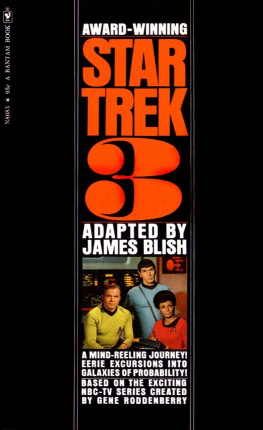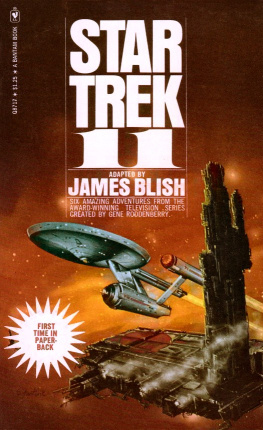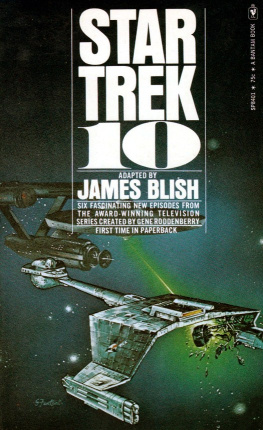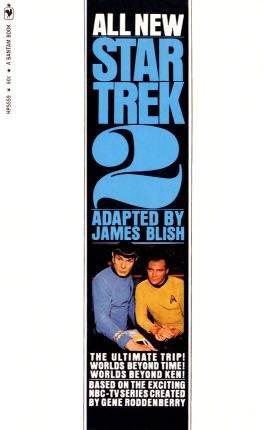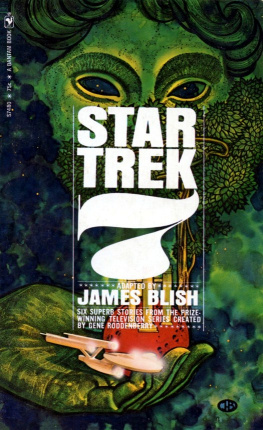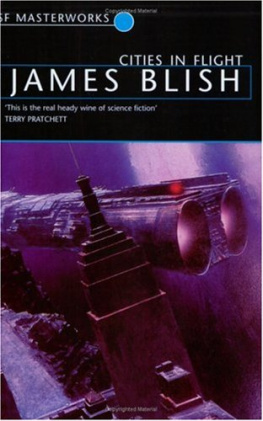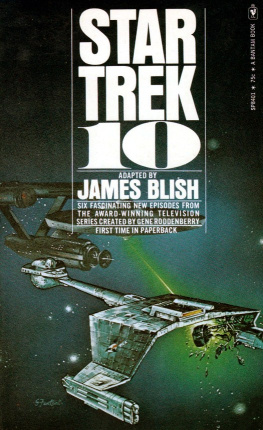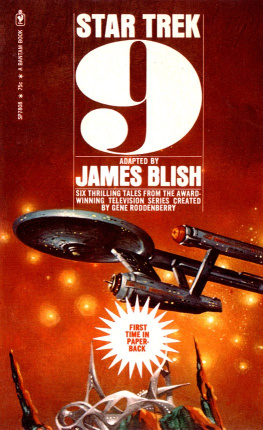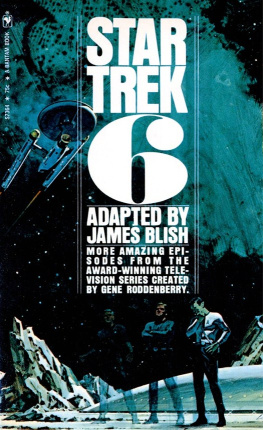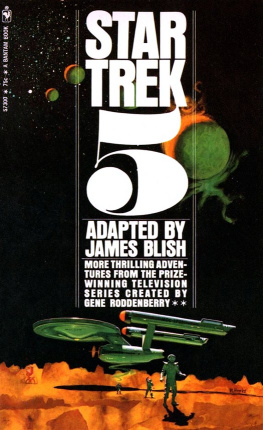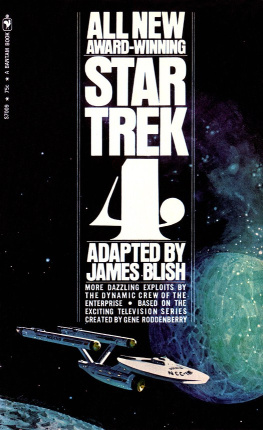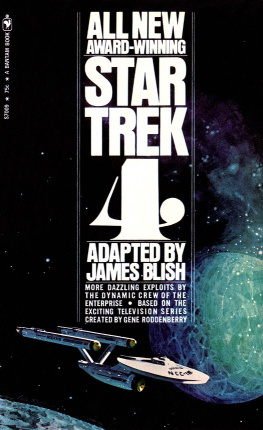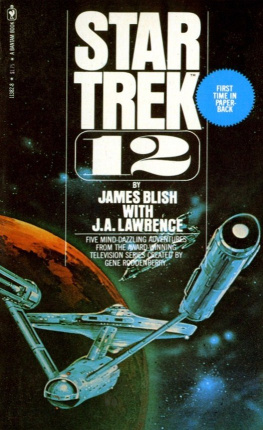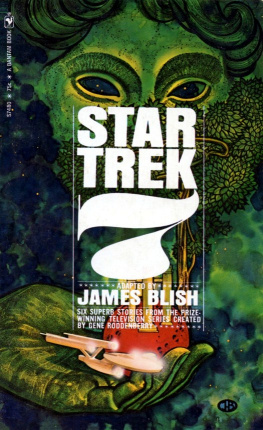James Blish - Star Trek 3 (No. 3)
Here you can read online James Blish - Star Trek 3 (No. 3) full text of the book (entire story) in english for free. Download pdf and epub, get meaning, cover and reviews about this ebook. year: 1981, publisher: Bantam Books (Mm), genre: Detective and thriller. Description of the work, (preface) as well as reviews are available. Best literature library LitArk.com created for fans of good reading and offers a wide selection of genres:
Romance novel
Science fiction
Adventure
Detective
Science
History
Home and family
Prose
Art
Politics
Computer
Non-fiction
Religion
Business
Children
Humor
Choose a favorite category and find really read worthwhile books. Enjoy immersion in the world of imagination, feel the emotions of the characters or learn something new for yourself, make an fascinating discovery.
- Book:Star Trek 3 (No. 3)
- Author:
- Publisher:Bantam Books (Mm)
- Genre:
- Year:1981
- Rating:3 / 5
- Favourites:Add to favourites
- Your mark:
- 60
- 1
- 2
- 3
- 4
- 5
Star Trek 3 (No. 3): summary, description and annotation
We offer to read an annotation, description, summary or preface (depends on what the author of the book "Star Trek 3 (No. 3)" wrote himself). If you haven't found the necessary information about the book — write in the comments, we will try to find it.
Star Trek 3 (No. 3) — read online for free the complete book (whole text) full work
Below is the text of the book, divided by pages. System saving the place of the last page read, allows you to conveniently read the book "Star Trek 3 (No. 3)" online for free, without having to search again every time where you left off. Put a bookmark, and you can go to the page where you finished reading at any time.
Font size:
Interval:
Bookmark:
AN EXTRAORDINARY JOURNEY
INTO THE SUPERNATURAL!
Seven chilling stories into the bizarre and unexpected with the crew of the starship Enterprise. Travel to the unknown regions of outer space, to worlds where unearthly powers can control human beings and where unspeakable horror becomes normal. Unimaginable new galaxies of strange beings, bizarre customs, unknown dangers and awesome excitement. A world threatened by tribbles, small and furry with no eyes or facesonly a mouth. A killer planet where time and place change by telepathy. A monster robot that smashes planets and digests them. An alien being who comes to Earth to start World War III.
A GALACTIC TICKET TO INFINITE ADVENTURE.

BASED ON THE EXCITING
NEW NBC-TV SERIES CREATED
BY GENE RODDENBERRY

A NATIONAL GENERAL COMPANY
STAR TREK 3
A Bantam Book / published April 1969
All rights reserved.
Copyright 1969 by Bantam Books, Inc.
Copyright 1969 by Paramount Pictues Corporation.
This book may not be reproduced in whole or in part,
by mimeograph or any other means,
without permission in writing.
Published simultaneously in the United States and Canada
ISBN-13: 978-0553123128
Bantam Books are published by Bantam Books, Inc., a subsidiary of Grosset & Dunlap, Inc. Its trade-mark, consisting of the words "Bantam Books" and the portrayal of a bantam, is registered in the United States Patent Office and in other countries. Marca Registrada. Bantam Books, Inc., 271 Madison Avenue, New York, N.Y. 10016.
PRINTED IN THE UNITED STATES OF AMERICA
Some Awards for Star Trekand an Open Letter
Science-fiction fans hold an annual World Convention, which is held in a different city every year (though it has been outside the United States only once so far, in London in 1965). The most recent one, in Berkeley, Calif., was the twenty-sixth.
One of the many items on the program is the giving of achievement awards for the best s-f novel, novelette, short story and so on of the preceding year. These awards are statuettes called "Hugos," after the late Hugo Gernsback, who founded the first science-fiction magazine (Amazing Stories) in 1926.
In recent years, one of the categories has been "Best Dramatic Presentation," but there have seldom been many nominations for this category, and at at least one convention the decision was, "No award."
But since Star Trek came along, things have been different. At the 1967 convention in New York, the winner for Best Dramatic Presentation was Gene Roddenberry, not as originator and producer of Star Trek (though he was both), but as the author of the episode called "The Menagerie," which appeared during the show's first season.
And in 1968, all four of the nominees for Best Dramatic Presentation were from Star Trek. Three of those scripts are adapted in this collection; I have indicated them by asterisks.
What about the fourth? Well, the fourth was the actual Hugo winner, "The City at the Edge of Forever," by Harlan Ellison. It is not in this collection for the simple reason that I had already put it in the preceding book, STAR TREK TWO. And judging by my mail, it was the heavy favorite there, toowhich is a separate matter, since s-f fandom and Star Trek fandom do not seem to overlap very much, certainly by no more than 10 per cent. The Hugo, by the way, was not Mr. Ellison's first award for that script; it was also voted the best single TV script of the year, regardless of category, by the television writers themselves. This award was given, however, not for the script as it ran on Star Trek, but for Mr. Ellison's original version, which had to be edited for the showfor one thing, it was too long. I mention this because readers of STAR TREK TWO may remember that in doing the adaptation of the script I tried to preserve what I thought were the best features of both versions. I feared that I might just have spoiled the whole thing in the process, but the readers' letters said not (and Mr. Ellison said not, too).
There is more that ought to be said about the fan mail, partly because it is, I think, interesting in itself, and partly in the hope that the facts might influence those sponsors and network officials who put too much faith in TV rating services. Beginning in 1951, I have written twenty-seven published novels and short-story collections (and including a volume of essays on science fiction). All of these books are still in print but one, and one of them was itself a Hugo winner. In addition, I've written many short stories and other lands of material; the first one of these appeared early in 1940, and many have been anthologizedseveral of them repeatedlyin 58 different collections at last count. In 29 years my work has appeared in 18 different countries.
I note these figures not to bragwell, not entirely, anyhowbut as background for one astonishing fact: I have received more mail about my two previous Star Trek books than I have about all my other work put together.
I don't have to count the letters to establish this. All I have to do is look at the comparative thickness of two accordion file folders.
These letters have been arriving at an average rate of two a day ever since January 1967. They make an astonishing collection. The writers range from children under 10, through college undergraduates (a large sub-group) to housewives. Not all the writers give their ages, of course, but enough of them do to make an adequate statistical sample, so I can say with fair confidence that the average age is 13. The medium age, however, is 15that is, there are just as many writers over that age as there are under it.*
*This difference shows that those over 15 are mostly young adults. The top stated age is 28.
Most of them say that they have never read, or seen, any science fiction before Star Trek, or if they have, that they hadn't liked it. Some ask me to recommend other s-f books, or name some other books I have written. Still others announce a strong urge to write the stuff themselves, sometimes documented by accompanying manuscripts. In short, the evidence is strong that Star Trek has created an almost entirely new audience.
For over a year I tried to answer every one of these letters, however briefly, but the inroads this made on my creative writing time became a serious matter and I had to give it up, with regrets. (To give up answering the letters, that is!) However, there is one answer that I found myself making over and over which I would like to repeat here. That is the answer I gave to people who sent me Star Trek short stories, outlines, suggestions for scripts for the show, or even complete scripts:
"I have nothing to do with any aspect of the Star Trek show, including the selection of scripts. All I do is adapt some of the scripts into short stories. Furthermore, it is a firm rule of the producers that anyone even vaguely connected with the show who receives any sort of submission from anybody other than a recognized agent must return it unread, which is what I am doing in your case too. There are sound legal reasons for this which I'm sure you will understand.
"Furthermore, if you want to sell science fiction, your chances would be considerably greater if you tried to write a completely original story for one of the magazines, rather than basing your work on the characters and back ground of an already famous TV show. Originality is valued more highly in science fiction than in any other branch of literature. Hence, no matter what your affection for the
Font size:
Interval:
Bookmark:
Similar books «Star Trek 3 (No. 3)»
Look at similar books to Star Trek 3 (No. 3). We have selected literature similar in name and meaning in the hope of providing readers with more options to find new, interesting, not yet read works.
Discussion, reviews of the book Star Trek 3 (No. 3) and just readers' own opinions. Leave your comments, write what you think about the work, its meaning or the main characters. Specify what exactly you liked and what you didn't like, and why you think so.

